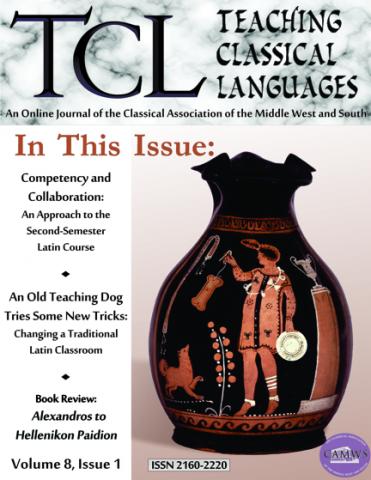Welcome to Teaching Classical Languages (TCL). TCL is the peer-reviewed, online journal dedicated to exploring how we teach (and how we learn) Greek and Latin. TCL is sponsored by the Classical Association of the Middle West and South (CAMWS).
Volume 8 Issue 1

Abstracts of Articles
Competency and Collaboration: An Approach to the Second-Semester Latin Course
This essay explains and explores how the author designed a second semester elementary Latin course in order to meet the diverse needs and preparation of students. The approach features a combination of stepped learning, which emphasizes student mastery of the material before proceeding to a new content set, and collaborative learning techniques inspired by Student-Centered Learning Environment for Undergraduate Programs (SCALE-UP), a method most often found in STEM disciplines. By moving away from a teacher-centered classroom and toward an individually paced, peer-supported model of engaged learning, the author found that students better retained information, deepened the questions they asked of the instructor and one another, began to see errors and small-scale failure as formative rather than ruinous, and became more nuanced, confident evaluators of their work and comprehension. Although this approach does present some challenges, for example those of fast and frequent grading and difficulties of student motivation, on the whole the course-specific as well as the lifetime skills (time management, self-discipline, responsibility for one’s learning) that students took away from the course merit its expansion and further development.
Review Article: Alexandros to Hellenikon Paidion
Alexandros is a derivative of Rouse’s A Greek Boy at Home (1909). This review sets the Ancient Greek pedagogical context in which this book arrives, describes its contents in detail, and considers whether this text might be used for a text-based, communicative approach Ancient Greek course.
An Old Teaching Dog Tries Some New Tricks: Changing a Traditional Latin Classroom
A mid-career classics professor, who has taught beginning Latin with a modified grammar-translation approach for many years, gives an account of how he came to experiment with more active and oral techniques inspired by some of the recent work on Latin and second language acquisition and his preliminary assessment of that experiment.

